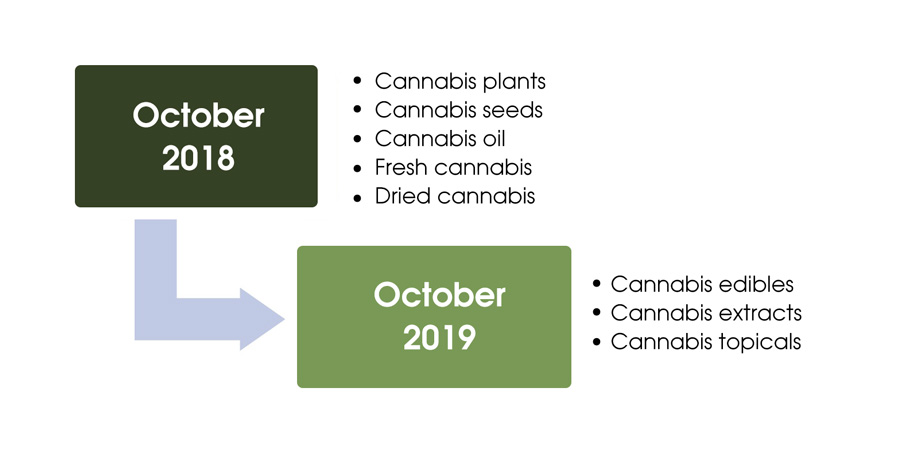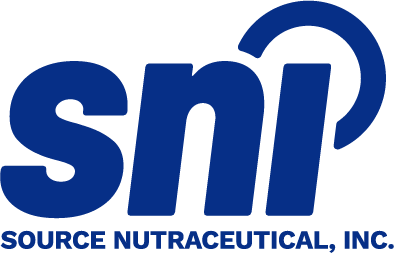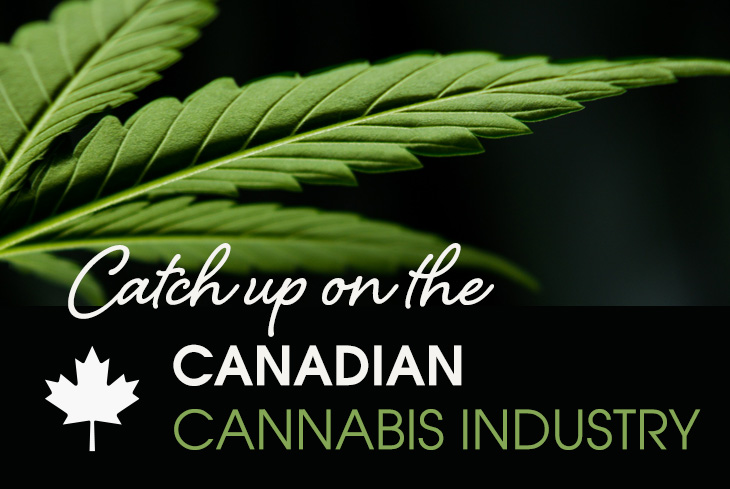On October of 2018, the Cannabis Regulations came into force, bringing major change to how cannabis is regulated in Canada.
Legalization of different types of cannabis products for medical and recreational use was implemented in a step-wise manner, as follows:

How has legalization of Cannabis impacted Canadians??
- Adult Canadians (aged 18+) can legally carry up to 30 g of dried cannabis, or grow up to 4 cannabis plants in their homes for personal use, without penalty.
- Statistics Canada consumption expenditure data reports that Canadians have spent 4.347 billion dollars on cannabis to date in 2019, with third quarter (July – September) expenditures estimated at 1.432 billion.
- As of September of 2019, data from Statistics Canada indicates that 17% of Canadians (more than 5 million people) have reported using cannabis.
- The greatest increase in cannabis use comes from seniors (adults aged 65+), with more than 400,000 seniors reporting cannabis use in the past 3 months.
- Seniors are more likely to use cannabis for medical reasons (as opposed to recreational reasons).
- As cannabis becomes more popular with older adults, the average age of Canadian cannabis users has increased, from 29.4 years in 2004, to 38.1 years in 2019.
How can Canadians legally purchase Cannabis?
Recreational Cannabis
With the legalization of cannabis on October 17, 2018, Canadians can now purchase several types of cannabis from licensed retailers for recreational use, including cannabis plants, cannabis seeds, cannabis oil, fresh cannabis or dried cannabis. Cannabis products containing cannabidiol (CBD) can also be sold at licensed retail outlets, only if indicated for medical use, and only if the product does not make a health claim. CBD oil products wishing to make health claims must undergo the pre-market regulatory approval process for prescription drugs, as CBD oil is listed on the Prescription Drug List in Canada. CBD products making health claims cannot be sold at recreational cannabis stores.
As of October 17, of 2019, the next phase of recreational cannabis products have been legalized, including cannabis edibles, extracts and topicals. As there is a 60-day licensing period for cannabis edibles, Canadian consumers can expect to see edible products on shelves any day now (on or about December 17, 2019).
Medical Cannabis
Cannabis health products indicated for therapeutic (medical) use must be obtained by a prescription from a health care practitioner.
Traditional Retail Channels
Cannabis oil (hemp seed oil) can be sold at the retail level as a Natural Health Product [NHP] if it contains less than 10 ppm of THC (9-Tetrahydrocannabinol). NHPs (or Veterinary Health Products [VHPs]) can only contain parts of cannabis or hemp plants which are excluded from application of the Cannabis Act, including:
- Non-viable seeds
- Hemp-seed derivatives compliant with the Industrial Hemp Regulations
- Mature stalks that do not include any leaves, flowers, seeds or branches and fibre from such stalks
CBD oil cannot legally be sold in Canada as a NHP, due to its inclusion on the prescription drug list. However, there is a large political movement in support of allowing CBD oil in self-care products, including NHPs. The Canadian Health Food Association (CHFA), Canada’s largest trade association representing the natural health and organic industries, has been lobbying the Canadian government to reconsider CBD oil as an NHP medicinal ingredient. CBD is found in several varieties of the cannabis plant and is also found in commercial hemp products. Data presented by the CHFA indicates that the market for CBD products could reach $1 billion CAD annually by 2023. If you are interested in supporting CHFA’s CBDisNatural campaign, click here for more information.
Interested in developing cannabis food products for Canada?
If you are interested in developing an edible cannabis product, there are a few points to consider…
- As of October 17 of 2019, Health Canada made it legal to produce and sell cannabis edibles, cannabis extracts and cannabis topicals.
- Cannabis edibles will only be legal for human consumption – not for pets! ?
- Health Canada has set limits on the amount of cannabis that can be added to food products. This includes a maximum amount of THC that can be added per product container, and even per unit of food being consumed.
- As mentioned in our Get Your Edible Answers Here! Blogpost, Health Canada has outlined specific nutritional information that will be required on the labels of edible cannabis products. This information will be similar to general food labeling requirements.
- There are also regulatory requirements for cannabis edibles; licensed producers must inform Health Canada of any new marketed cannabis edibles at least 60 days prior to sale. As we are almost 60 days from the October 17 legalization date, Canadian consumers can anticipate being able to purchase cannabis edibles any day now!
Does your company have interest in developing edible cannabis products? If you do, our regulatory experts would be happy to help! Reach out and connect with Source today!
What lies ahead in 2020?
The Canadian cannabis market will undoubtedly see an explosion in new cannabis product development in 2020, with cannabis edibles, extracts and/or topical products expected on store shelves any day now!
However, will we also see Natural Health Products or Veterinary Health Products making claims about the health benefits of CBD in 2020? It will be interesting to see if the political movement behind “CBD is natural” gains traction in Ottawa, and if CBD oil products will be allowed to be sold in traditional retail stores in the future.





